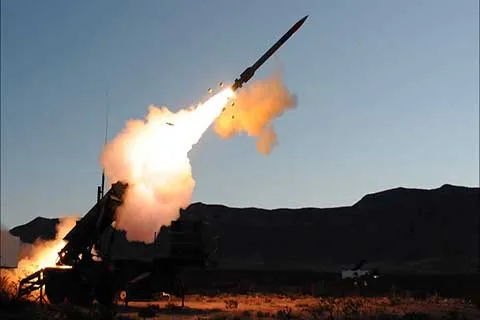New Delhi, Apr 14: The volley of strikes emanating from Iran toward Israel continued for approximately five hours, marking an escalation in regional tensions.
US President Joe Biden lauded American forces for their role in countering the onslaught, asserting they “assisted Israel in neutralizing nearly all” of the drones and missiles deployed by Iran during Sunday’s assault.
He commended the swift deployment of US aircraft and destroyers to the area before the unprecedented attack, emphasizing, “I condemn these attacks in the strongest possible terms.”
Israel reported that Iran released roughly 200 drones and missiles, a departure from its typical indirect methods of confrontation.
While the Israeli Defence Forces (IDF) intercepted the “vast majority” of the projectiles, a few managed to breach defences, causing damage including at an IDF base in southern Israel, where at least one person, reportedly a young girl, sustained injuries.
According to US media, American forces intercepted over 70 one-way attack drones and at least three ballistic missiles during the onslaught. The intercepts were conducted primarily by warships stationed in the eastern Mediterranean Sea, bolstering Israel’s defence capabilities. The US Navy’s presence in the region, with two guided missile destroyers equipped for such contingencies, proved instrumental in thwarting the attacks.
Media reports suggest that US fighter jets actively engaged in neutralizing Iranian drones targeting Israel, President Biden conveyed to Israeli Prime Minister Benjamin Netanyahu that Israel should perceive the outcome as favourable, given the assessment that the attacks largely faltered, highlighting Israel’s military prowess.
In the aftermath of Iran’s retaliatory strikes, CNN reported that President Biden reaffirmed to Prime Minister Netanyahu that the US would refrain from participating in offensive operations against Iran. But he said Washington’s commitment to Israel’s security against Iranian threats remains “ironclad.” This message was relayed during their post-attack phone conversation. In his conversation with Netanyahu, Biden emphasized Israel’s resilience in thwarting what he termed “unprecedented attacks,” signalling a clear message to adversaries about Israel’s military strength.
Israel’s Home Front Command rescinded its directive for citizens to remain in proximity to shelters, signalling a diminishing immediate threat. Despite a reduction in Iranian drone and missile launches during the early hours of Sunday, vigilance remained high both in Israel and among US forces in the region.
US President Joe Biden is set to convene with G7 leaders on Sunday, aiming to formulate a joint diplomatic response to what he described as Iran’s “brazen attack.” The White House released a statement outlining Biden’s intention to coordinate efforts with allied nations in the wake of the assault.
“We will engage with counterparts across the region and stay closely connected with Israel’s leaders,” Biden’s statement asserts. “While there have been no reported attacks on our forces or facilities today, we remain vigilant against all threats and are prepared to take necessary action to safeguard our people.”
The deployment of US defensive assets to the region earlier in the week proved pivotal, as they reportedly assisted Israel in intercepting the majority of incoming drones and missiles, according to the presidential statement.
The assessment from US officials indicates that Iran’s assault fell short of its objectives, with the vast majority of drones and missiles being neutralized before reaching their targets. No significant damage was inflicted, with more than 100 ballistic missiles reportedly intercepted.
While the situation remains fluid, US forces remain on high alert, ready to provide defensive support to Israel as needed. Despite a reduction in Iranian aggression, concerns persist, exemplified by the launching of rockets by Iranian proxy Hezbollah from Lebanon toward northern Israel early Sunday morning.
The Israeli military reports that more than 55 rockets have been launched from Lebanon into Israel. This follows an earlier barrage of about 40 rockets fired from southern Lebanon on Friday, according to the Israel Defence Forces. Hezbollah militants have claimed responsibility for these attacks, stating they targeted Israeli artillery positions in response to recent Israeli actions and in solidarity with Palestinians in Gaza.
The escalating tensions have impacted air travel in the region, with United Airlines cancelling several flights and several airlines including Air India diverting the air space.
Tensions between Israel and Hezbollah along Lebanon’s southern border have escalated since the beginning of the Hamas-Israel conflict on October 7. Hezbollah, an Iranian-backed Lebanese armed group, primarily operates in this region. Since October 7, Hezbollah has frequently launched missiles into Israel, prompting retaliatory measures from Israel, including airstrikes. As a precautionary measure, Israel has ordered the evacuation of communities along the Lebanese border.
Earlier in April, Iran issued a warning that Israel would face consequences for a strike on its consulate in Syria on April 1, which resulted in the deaths of seven Iranian officers, including a senior commander. Israel has neither confirmed nor denied its involvement in the incident.







